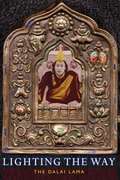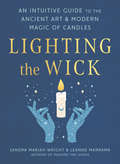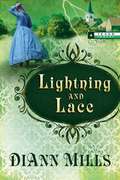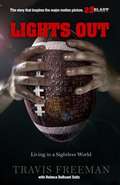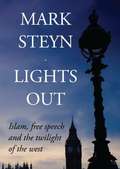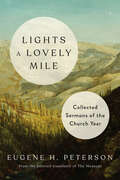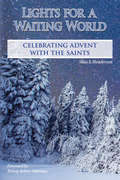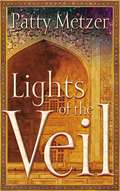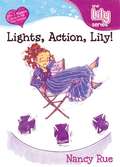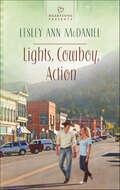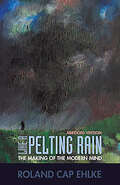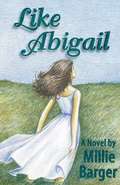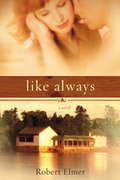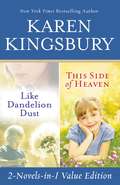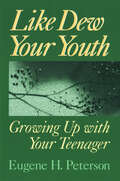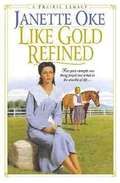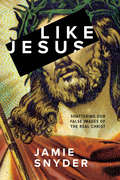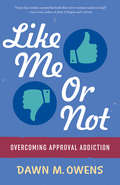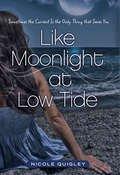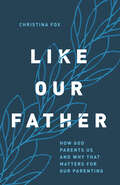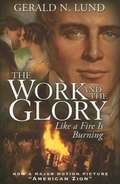- Table View
- List View
Lighting the Way
by Dalai Lama Thupten JinpaThe Dalai Lama offers Westerners an accessible introduction to the path of Tibetan Buddhism. He begins with a discussion of the Four Noble Truths, which contain basic teachings on dealing with suffering and cultivating happiness and peace. Next, he provides commentary on two important short texts: Eight Verses on Training the Mind and Atisha's Lamp for the Path to Enlightenment. A glossary of terms completes the volume.
Lighting the Wick: An Intuitive Guide to the Ancient Art and Modern Magic of Candles
by Sandra Mariah Wright Leanne MarramaAn illustrated guide to improving your life through the simple act of lighting a candle. Whether you would like to take back control in an uncertain world or turn a dollar-store candle into a means to manifest your desires, Lighting the Wick will help transform your life with candle magic. Learn how to: • find, repair, or end a relationship; • guard your boundaries and keep negative energy and toxic people out; • ground and center; • achieve common health goals; • break bad habits, bolster motivation, and increase willpower; and • meditate with the assistance of candles. Candles represent faith and hope—a light in the darkness, the warmth of love, the heat of passion, and the fire of spirit. Here, Salem-based intuitives Sandra Mariah Wright and Leanne Marrama show you how to put the power of these simple tools to work for you in your daily life, to improve your relationships, achieve success, provide protection, increase health, honor those who have passed, and more. You don&’t have to be a witch to find your inner magic.
Lightning and Lace (A Texas Legacy book #3)
by Diann MillsBest-selling author, DiAnn Mills, has crafted a poignant historical romance set in Texas during the late 1800s. In this third book of the Texas Legacy series, Bonnie Kahler doesn't think she will survive widowhood or raising three children alone. Then the new preacher, Travis Whitworth, arrives in town. Lightning strikes her heart even as she struggles with her wayward son, Zack. But what are the secrets everyone seems to be hiding?
Lights Along the Way: Great Stories of American Faith
by Thomas J. FlemingOur history books are full of important episodes in America's past, and of general biographies of those who have made that history. Rarely do they record, however, how an individual's faith shaped those events. Here, filling in the missing pieces, are thirty-seven portraits of defining moments in American religious history ranging from the Pilgrims to contemporary figures, including: Samuel Sewall, Ben Franklin, George Washington, Johnny Appleseed, Sojourner Truth, Emily Dickinson, Robert E. Lee, Woodrow Wilson, Dorothy Day, Bess Truman, John F. Kennedy, and others.
Lights Out
by Travis FreemanWhen the lights go out - play harder. Travis Freeman plunged into a world of darkness at 12 years old. A rare occurrence of a routine illness stole his sight, leaving the small-town Kentucky boy's dreams of football and fun languishing on the sidelines. Having given his heart to Jesus merely a year before the illness, Travis knew one thing: God was still the light for his life. That life story is now the inspiration for a major motion picture, ""23 BLAST"" that hits theatres in October 2014.
Lights Out: Islam, Free Speech and the Twilight of the West
by Mark Steyn"Free speech is the whole thing, the whole ball game. Free speech is life itself." Salman Rushdie said. Mark Steyn and McLane's, the premier Weekly News Magazine, were attacked by the Islamists using the human rights commissions of Canada. Mr. Steyn shows us how to defend free speech and what will too soon happen if we don't. Roaming from America to Europe to Australia, Lights Out is a trenchant examination of the tensions between a resurgent Islam and a fainthearted west - and of the implications for liberty in the years ahead. In 2007, the Canadian Islamic Congress brought three suits against Maclean s, Canada s biggest-selling newsweekly, for running an excerpt from Steyn s bestselling book America Alone, plus other flagrantly Islamophobic columns by the author. A year later the CIC had lost all its cases and Steyn had become a poster boy for a worldwide phenomenon - the collision between Islam, on the one hand, and, on the other, western notions of free speech, liberty and pluralism. In this book, Steyn republishes all the essays the western world's new thought police attempted to criminalize, along with new material responding to his accusers. Covering other crises from the Danish cartoons to the Salman Rushdie fatwa, he also takes a stand against the erosion of free speech, and the advance of a creeping totalitarian "multiculturalism"; and he considers the broader relationship between Islam and the west in a time of unprecedented demographic transformation.
Lights a Lovely Mile: Collected Sermons of the Church Year
by Eugene H. PetersonEugene H. Peterson&’s never-before-published wisdom for each season of the Christian yearThe glorious, never-dull reality of the gospel is this: Christ sets us free. All of us can be doers of the word, using the stuff of the everyday to make something to the glory of God.Long before his iconic paraphrased Bible translation, The Message, Eugene H. Peterson (1932–2018) faithfully preached for decades to the small congregation of Christ Our King Presbyterian Church in Bel Air, Maryland. As the seasons passed, along with the accompanying fasts and feasts, Peterson faithfully revealed ways to cultivate a robust, authentic life of faith, intimacy, obedience, and joy.Now you can gain new insights into Peterson&’s preaching and pastoral life through this collection of his most compelling yet never-before-published sermons. Following the calendar of the church year, from the darkness of Advent to the light of Epiphany, the wilderness of Lent to the celebration of Easter, and the fire of Pentecost to the everyday glory of ordinary time, these remarkable sermons point to the eternity beyond our experience of time.With his trademark wit and wisdom, Peterson shows how to pursue a &“long obedience in the same direction&” through all the seasons, colors, and rhythms of our lives.
Lights for a Waiting World
by Silas HendersonThe four-week season of Advent is a time of miracles. These days have the power to transform us, if we can be open to the graces of the season. In this book, readers watch and wait for Christ's coming with the saints, whose lives embodied so many of the Advent virtues. Included in this book are reflections and prayers inspired by the passages of Scripture read during the Mass each day of Advent, references for the readings themselves, and a forward by Bishop Robert Morneau.
Lights of the Veil
by Patty MetzerFaith and purpose collide in the exotic setting of this powerful love story. Through mysterious circumstances, Erica Tanner meets her late sister's only child, Betul. Within hours they are kidnapped and taken to India, where an unexpected friendship with the handsome Prince Ajari complicates Erica's escape -- especially when she learns he is Betul's uncle. As friends attempt a rescue, Erica fights to fulfill her sister's final request -- Betul must not become lost in Sajah Ajari's Hindu heritage. Can the light of Christ overcome the differences holding Erica and Sajah captive? Breathtakingly paced, Lights of the Veil moves with grand adventure toward the ultimate triumph of God's truth.From the Trade Paperback edition.
Lights, Action, Lily!
by Nancy RueLily's at it again, but this time, she's destined to be the next big "star." She's certain her name will be up in lights and she'll be front-and-center stage. Cast in a school play as Kate in Shakespeare's Taming of the Shrew, Lily springs into "action" and throws herself into the role. But there is one major problem--Shad. He is cast in the major role of Petruchio opposite her and plays her suitor. However, when Ashley gets jealous, she's determined to stop at nothing to bungle the show. Filled with tons of antics, hi-jinks, tangles, and knots, Lily has to learn that relationships are more important than a perfect performance.
Lights, Cowboy, Action
by Lesley Ann McDanielMatchmaking is not in Courtney’s job descriptionAs assistant to a famous actress, Courtney is used to fulfilling ridiculous requests. Then her boss demands a date with handsome cowboy Adam Greene while on location in Montana. Delivering up Adam just doesn’t seem right. Especially since Courtney’s got her eye on him, too.Adam’s not interested in high-maintenance actresses. But he can’t deny his attraction to sweet, fresh-faced Courtney. How can a small-town guy compete with glitz and glamour? Leave it to a cowboy to wrangle himself a Hollywood ending....
Like A Pelting Rain: The Making of the Modern Mind
by Roland Cap EhlkeWhen it comes to analyzing today's culture, people talk about politics, economics, and even morals. Like a Pelting Rain: The Making of the Modern Mind goes deeper and looks at the spiritual condition of Western civilization.How we arrived at where we are is the long and complex interplay of theology and culture. Understanding the trends of the times does not necessitate accepting them. God calls upon Christians to contend for the faith. The Holy Spirit is still at work, and the Gospel remains the power of God for the salvation of all who believe!
Like Abigail
by Millie BargerWhat's in the name "Abigail"? Why does Gail have so few options? Will her beloved brother come for her? Can she have a life outside of Sunhaven? Who sends a letter that changes many lives?
Like Always
by Robert ElmerWhen Will and Merit Sullivan decide to escape midlife blues and buy a small, dilapidated resort in northern Idaho, their dreams finally seem within reach. More importantly, their twenty-year-old son Michael has just returned from Iraq, thrilling his younger sisters and making their family complete again. So the morning Merit discovers she is pregnant, at the age of forty-five, she is shocked. Can their lake lifestyle adjust to having a little one in the house? It seems too much to ask--until devastating news forces the biggest decision of all. As Will and Merit face the greatest trial of their lives, the couple must re-examine their faith and their devotion to each other in a truer way than they could ever have imagined. Inspired by a true story, Like Always explores the triumph of real-life love and asks if we can ever go back to the way things used to be.
Like Dandelion Dust & This Side of Heaven Omnibus
by Karen KingsburyTwo of New York Times bestselling author Karen Kingsbury's most beloved novels are now available together in this expertly packaged omnibus.LIKE DANDELION DUST is a powerful novel about two parents, their love for their adopted son, Joey, and the suprising lengths they will go to keep their family together when a judge rules that Joey must be returned to his biological father. In the days that follow, Jack Campbell has a desperate and dangerous thought. What if they can devise a way out? Then they could take Joey and disappear...like dandelion dust.THIS SIDE OF HEAVEN is a story of secrets, broken relationships, and a love strong enough to reunite a family. Annie Warren always wanted the best for her son, Josh. But years of failure and bad choices created a heartbreaking distance. When Annie sets out to defend her son, she might find a treasure more valuble than money, one she never expected, this side of heaven.
Like Dew Your Youth: Growing Up with Your Teenager
by Eugene H. PetersonAdolescence is a gift, writes author Eugene Peterson. "God's gift, to the parent in middle-age. This 'gift' dimension of adolescence is my subject. For adolescence is not only the process designed by the Creator to bring children to adulthood, it is also designed by the Creator to provide something essential for parents during correspondingly critical years in their lives. Christian parents are most advantageously placed to recognize, appreciate, and receive this gift God so wisely provides." In Like Dew Your Youth Peterson shows how adolescence is a time for parents to enjoy a deeper, richer relationship with their children and for both parents and children to grow in their relationships with Jesus Christ. In addition to its wealth of positive, effective ways to deal with many of the problems and pains of growing up, this insightful book offers an understanding of parent-adolescent relationships that will help promote an atmosphere of communication, growth, frankness, forgiveness, love, and harmony in the home. Study questions at the end of each chapter help readers apply Peterson's practical, Bible-centered teaching. There are also tips for using this material within the framework of parental support groups. Like Dew Your Youth provides a much-needed balm against the fear and anxiety bred by traditional views of this exciting period of life and properly orients parents and teenagers within this God-provided environment for spiritual growth.
Like Gold Refined (Prairie Legacy #4)
by Janette Oke4th book in the Prairie Legacy series. Virginia and Jonathan and their family face the greatest trial of all.
Like Jesus
by Jamie SnyderJesus invited his disciples to follow Him. Yet today many Christians and churches are unintentionally following counterfeit versions of the Savior such as the American Jesus, the Emergent Jesus, or the Mr. Rogers Jesus. Not surprisingly, most look a lot more like us than Jesus. In Like Jesus, author Jamie Snyder exposes the counterfeit versions of Jesus while taking readers on the three-stage journey of Imitation, Identification, and Intimacy. Because the only way to become like Jesus is to discover what Jesus is really like.
Like Me or Not: Overcoming Approval Addiction
by Dawn OwensThere is a difference between being someone other people like and being defined by what others think. Some people are so addicted to approval that their lives spiral out of control creating discontent, depression, and alienation. Recovering approval addict Dawn Owens identifies all the ways craving approval can negatively impact our lives, and offers sound, biblical strategies to overcome them. Using her own and other’s stories as relatable examples, Owens shares the journey to an identity found only in Christ.
Like Moonlight at Low Tide: Sometimes the Current Is the Only Thing that Saves You
by Nicole QuigleyWhen high school junior Melissa Keiser returns to her hometown of Anna Maria Island, Florida, she has one goal: hide from the bullies who had convinced her she was the ugliest girl in school. But when she is caught sneaking into a neighbor's pool at night, everything changes. Something is different now that Melissa is sixteen, and the guys and popular girls who once made her life miserable have taken notice. When Melissa gets the chance to escape life in a house ruled by her mom's latest boyfriend, she must choose where her loyalties lie between a long-time crush, a new friend, and her surfer brother who makes it impossible to forget her roots. Just as Melissa seems to achieve everything she ever wanted, she loses a loved one to suicide. Melissa must not only grieve for her loss, she must find the truth about the three boys who loved her and discover that joy sometimes comes from the most unexpected place of all.
Like Our Father: How God Parents Us and Why that Matters for Our Parenting
by Christina FoxReveal God to your children by parenting them like He parents us.Tired of all the parenting books full of strategic checklists, how-to advice, and quick tips? If so, this book is for you. Instead of focusing on parenting techniques, it&’s about who God is, who we are in light of that, and how God&’s character gives form and shape to our parenting.Christina Fox wants you to explore the Scriptures with her and discover the goodness of the God who makes us His own. As God&’s beloved creatures, we bear His image—that is, we show others who He is as we glorify Him. Is anything more important to pass on to our children than this? In Like Our Father, you&’ll learn to parent in light of the timeless and profound truths that God:Is our adoptive FatherIs consistentProvides boundariesTeaches and trains usDisciplines usGives us what we needResponds patientlyLoves us unconditionallyThough it&’s tempting to want a step-by-step instructional manual on how to raise kids, what you really need is a clearer, grander, bolder vision of your Heavenly Father. When you&’ve got His character before your eyes, you&’ll live it out in front of your kids. And as they share in your magnified vision of God, they&’ll begin to live as the image-bearers that He made them to be.
Like Our Father: How God Parents Us and Why that Matters for Our Parenting
by Christina FoxReveal God to your children by parenting them like He parents us.Tired of all the parenting books full of strategic checklists, how-to advice, and quick tips? If so, this book is for you. Instead of focusing on parenting techniques, it&’s about who God is, who we are in light of that, and how God&’s character gives form and shape to our parenting.Christina Fox wants you to explore the Scriptures with her and discover the goodness of the God who makes us His own. As God&’s beloved creatures, we bear His image—that is, we show others who He is as we glorify Him. Is anything more important to pass on to our children than this? In Like Our Father, you&’ll learn to parent in light of the timeless and profound truths that God:Is our adoptive FatherIs consistentProvides boundariesTeaches and trains usDisciplines usGives us what we needResponds patientlyLoves us unconditionallyThough it&’s tempting to want a step-by-step instructional manual on how to raise kids, what you really need is a clearer, grander, bolder vision of your Heavenly Father. When you&’ve got His character before your eyes, you&’ll live it out in front of your kids. And as they share in your magnified vision of God, they&’ll begin to live as the image-bearers that He made them to be.
Like There's No Tomorrow: Meditations for Women Leaving the Patriarchy
by Carolyn GageNo woman who cares about anyone or anything should be without this book! In short, positive, meditative essays, Gage clarifies and explores the vulnerabilities and challenges of being an active, passionate woman. The goal is not to complain, but rather to encourage, to uplift, and to provide a guide to renewal, achievement, and freedom to lead, grow, bless, and create. FROM THE PUBLISHER Like There's No Tomorrow takes no prisoners. This is a meditation book which will clear your political sinuses and blow out the cobwebs of fuzzy "live-and-let-live" thinking. The essays may be read as a series of mini-lectures or as inspirational meditations. From such Hot Role Models as Gertrude Stein, Chyrstos, bell hooks, Sor Juana Ines de la Cruz and Audre Lorde. The quotations have been selected with scrupulous attention to multiculturalism, which not only includes representation of women of varying races and ethnicities, but also of varying physical abilities, ages, weights, sexual orientations, and class background.
Like a Bee to Honey (The Honeybee Sisters #3)
by Jennifer BeckstrandAffectionately dubbed The Honeybee Sisters in their Wisconsin Amish community, the three Christner girls are devoted beekeepers who are coming-of-age--and discovering the sweet surprise of love... Shy, skittish Rose Christner is more comfortable tending to the beehives on the family farm and keeping her aunt's unruly cats in line than attending social gatherings with the rest of the die youngie. A childhood trauma and secret shame keep her heart under lock and key, and Rose just can't accept the sweet attention she's receiving from a handsome neighbor. But the more she shies away from Josiah Yoder, the more their families sneakily plot to bring them together. And when a vandal who's been plaguing the Honeybee Farm starts targeting Rose, Josiah's steadfast protection--and patience--just may lead her into his waiting arms...Praise for Jennifer Beckstrand and her Matchmakers of Huckleberry Hill series "Full of kind, sincere characters struggling with the best ways to stay true to themselves and their beliefs."--Publishers Weekly "A delightful voice in Amish romance. Sweet and funny."--Emma Miller "Sweet romance with a lot of heart...Readers will treasure this series."--RT Book Reviews
Like a Fire is Burning (The Work and the Glory #2)
by Gerald N. LundThe epic saga of the Steed family continues in Volume 2. Swept up in the great drama as the infant Church expands and spreads westward into Ohio and Missouri, the Steeds become eyewitnesses of miracles as well as the horrors of mob mayhem.
